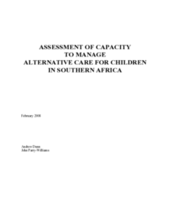This report, prepared for UNICEF East and Southern Africa Regional Office (ESARO) assesses capacity of Malawi, South Africa, Swaziland and Zambia to manage alternative care systems for children. It is timely as East and Southern African countries pilot and assess cash transfers to poor families, that are seen as having potential to reinforce extended family care. It is worth mentioning at the beginning of this document that it was difficult to obtain information on alternative care. For the most part there is no systematic data collection or collation centrally in these countries on the children living in informal or formal alternative care. It is difficult to discern trends that are not anecdotal. The information that was gathered is not particularly comprehensive and is often not capable of being disaggregated by gender or age. The absence of reliable data makes it difficult without further research to provide details on the additional costs that need to be borne in order to provide a comprehensive social protection system that tackles issues of child care and protection in line with the United Nations Convention on the Rights of the Child (UNCRC) and the Draft United Nations Guidelines on Alternative Care.

